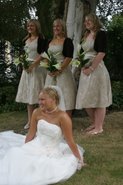It's not very often these days I am made to feel aware of my social
class. This could be due to the general lack of awareness I have as to
my surroundings or it may be that life has changed so much that such
things no longer have any meaning.
There is, of course, the odd time that I drop an aitches in polite
conversation and find someone wanting to correct me. And every now and
then someone might make a comment about their school and I am distinctly
reminded that the variety I attended was the second class modern type.
It was as if they were training us to be working class. The careers
teacher actually laughed at me when I informed him that I wanted to
become a maths teacher. Instead he sent me off for an interview at a
local engineering works. I didn't get the job partly because he sent
every other boy to the same interview. The guy who took the interview
sounded decidedly middle class not that I was really aware of what
difference it made.
Now, as the newsreels have been resounding with the news of a royal
wedding, we are informed that the future royal, Kate Middleton, is in
fact middle class.
This may not come as a surprise other than the fact that her parents
are millionaires. Herein lies the problem; how do we decide what counts
as lower, middle, or upper class in an age of egalitarian aspiration.
I was born to working class parents in suburb or a northern town. I
never considered myself to be anything other than working class and yet
several decades later I became a manager in a large company. Perhaps
during this time my staff would have considered me a traitor to by roots
but somehow I felt just the same as I had did all those years ago.
So what is it that determines ones class? Your parents, your job, your
wealth, your accent, your postcode, your attitude, or the school you
attended.
Whatever it is I am sure that our newest royal has no control over it.
Either the media, or the Great British public, or both will decide and
pass judgement accordingly. One report not only described her as middle
class but also a commoner.
I was intrigued to find that on hearing the engagement announcement
that one TV news company commissioned a poll to discover what the rest
of us commoners thought about it. It informed us that 62% of us had no
opinion what so ever.
Perhaps that is the real test of whether you are a commoner; you don't
have a significant opinion on the royalty or who they should marry.
The poll did reveal that men out number women when it comes to such
apathy. My wife often tells me that my behaviour is a little common.
This could explain why I didn't get the engineering job; or indeed
become a maths teacher.
I take it that Her Royal Highness the Queen approves of William's
choice of bride despite her more humble status, so that should be good
enough.
In that respect she has a lot in common with Mrs M, who informs me that
she wouldn't have protested had one of our girls decided to marry a
prince. She is definitely not a commoner.







